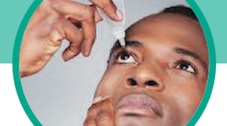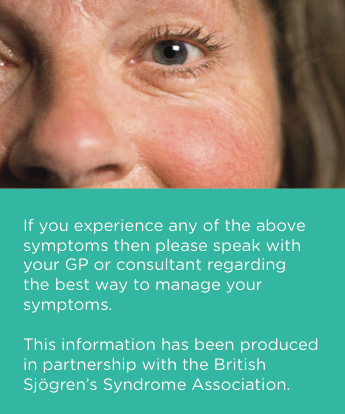Sjögren's Syndrome
Sjögren's (pronounced Show-grin's) syndrome is an autoimmune disorder. The body's immune system attacks glands that secrete fluid, such as the tear and saliva glands. Many people diagnosed with scleroderma will also be diagnosed with another autoimmune condition such as Sjögren's.
The effects of Sjögren's syndrome can be widespread. Certain glands become inflamed, which reduces the production of tears and saliva, causing the main symptoms of Sjögren's syndrome, which are dry eyes and dry mouth. In women (who are most commonly affected), the glands that keep the vagina moist can also be affected, leading to vaginal dryness.
Dry eyes

There is a deficiency of the watery component of the tears. This leads to poor wetting and lubrication of the surface of the eye, injury to the surface cells and a feeling of grittiness in the eye. There may be a burning or stinging sensation in the eyes or a tiredness or heaviness of the eyelids.
Discomfort to bright lights is common, and intermittent redness of the eye may occur. Mucus production can also be disturbed due to a loss of goblet cells. Long strands of mucus may form rolls which accumulate in the lower part of the tear sac. These may sometimes attach to the corneal surface as filaments and the lids may drag on these, causing bouts of pain.
Preserved drops
The majority of artificial tears contain a preservative, which enables the drops to be used for one month after opening the container. The presence of the preservative inhibits the growth of any bacterial contaminants that could enter the opened bottle and cause an infection in the eye.
Preservative-free preparations
For individuals who experience sensitivity to preparations containing preservatives it may be worth considering the use of preservative-free drops. These can be made up specifically by the hospital pharmacy and can only be used for a limited period of time (usually a single dose) to prevent the risk of bacterial contamination.
Using drops
Artificial tears are available on prescriptionand over the counter depending on the chosen preparation. It is sometimes necessary to try a variety of preparations to see which one you find the most effective and practical. Not all preserved drops for example, contain the same polymers or have the same formulation.
Practical tips:
• Avoid dry, air-conditioned environments.
• Use humidifiers and have plenty of plants with large leaves around the house to improve the humidity of your indoor environment.
• Moisture chamber glasses can be custom made and worn as a method of conserving tears. The side shields around the frame of the glasses, creates a humid environment around the eye and greatly reduces any evaporation.
Dry mouth - Xerostomia
The most common features of dry mouth are: • Difficulty in eating dry foods
• Pain or discomfort when swallowing
• General mouth discomfort
• Poor ability to taste
• Denture problems
• Increased tooth decay
• Mouth and salivary gland infections • Speech difficulties
• Oral Infections
Saliva substitutes
For individuals with no functional salivary tissue the use of saliva substitutes in the form of gels and mouth sprays, is the main line of treatment. Some of the products available in the market contain fluoride and are therefore recommended for individuals with their own dentition. Like artificial tear solutions, most formulations only last for a short while and so should be used as often as necessary. Saliva replacement gels are often favoured by many because they last longer and do not need to be used as regularly throughout the day.
Specially formulated dry-mouth toothpastes and mouthwashes are available and many people find these helpful although these are not available on prescription.
Saliva stimulants
The chewing of (sugar-free) gum and the eating of foods, which require vigorous chewing, can help to increase salivary flow. Some individuals find sucking acidic sweets effective, although
it is important to remember that these can be damaging to teeth. Salagen® (pilocarpine) is the only oral agent available in the UK with the ability to stimulate salivary and tear flow. It works by directly stimulating remaining glandular tissue. Clinical experience suggested that it has a fairly slow onset of action and you should persevere with the treatment, often for several months to obtain maximum benefit.
Some people experience side effects with Salagen® such as sweating, urinary frequency, change of bowel habit and flushing but clinical experience suggests that tolerance develops over time and short term discomfort often out weighs the long-term benefits. It can be helpful, to start with a low dose of 5mg once daily, and to wait until any such symptoms have subsided before increasing the dose. Many doctors will increase the dose at weekly, or longer intervals aiming to get three or four tablets daily for maximum benefit.
Sore mouth and ulcers
These can be treated with an antiseptic mouthwash, or more severe cases where pain is a particular problem an analgesic mouthwash or spray can be used instead. If ulcers or sores occur that do not respond to such simple treatment, further advice should be sought from your doctor or dentist.
Dental caries and oral hygiene
There are three simple precautions to take to help prevent the presence of dental caries:
- Avoid any sugar-containing drinks or snacks between meals and particularly before bed.
- Brush your teeth at least twice daily with a fluoride containing toothpaste.
- Use a fluoride containing mouthwash.
- Regular visits to the dentist are important. Practical tips:
- If dryness at night is a particular problem, it is helpful to have a glass of water available next to the bed if needed.
- Spreading a teaspoonful of salad oil around the mouth or breaking a vitamin E capsule into the mouth last thing at night can also improve lubrication and prevent the mouth from drying out while you sleep.
- Avoid tea, coffee, alcohol and other caffeinated drinks. These can be de-hydrating.
- Re-hydrate the mouth throughout the day by taking small sips of water. Sucking on ice cubes can have a similar effect.
Failure of secretions

In addition to the typical dry eye and dry mouth symptoms other secretions can be affected
as well. Dryness of the air passages such as the nose and trachea can occur making the airways hypersensitive to irritants such as tobacco smoke. To help combat this problem, the use of humidifiers and saline nasal sprays are recommended.
Sweat glands can also be affected resulting in severe dryness of the skin, which may be sensitive to strong sunlight. Such problems can be avoided by showering rather than bathing and avoiding the use of strong soaps, replacing lost moisture with the use of aqueous creams and emollients.
The large bowel may be affected in a functional way, resulting in what is sometimes called 'irritable bowel syndrome'. This can cause lower abdominal pain and alteration in bowel habit. Treatment of this tends to consist of the increase of fibre (bran) within the diet and occasionally the use of antispasmodic drugs.
It is also common for many women to complain of vaginal dryness leading to the use of lubricants. While simple lubricants such as KY jelly may be satisfactory in the short term, such lubricating jellies tend to have a short lasting effect. For a more permanent solution, you may favour oestrogen creams or HRT. If required, there are non-hormonal alternatives available, which can be purchased over the counter.
For more information please see NHS Direct.
